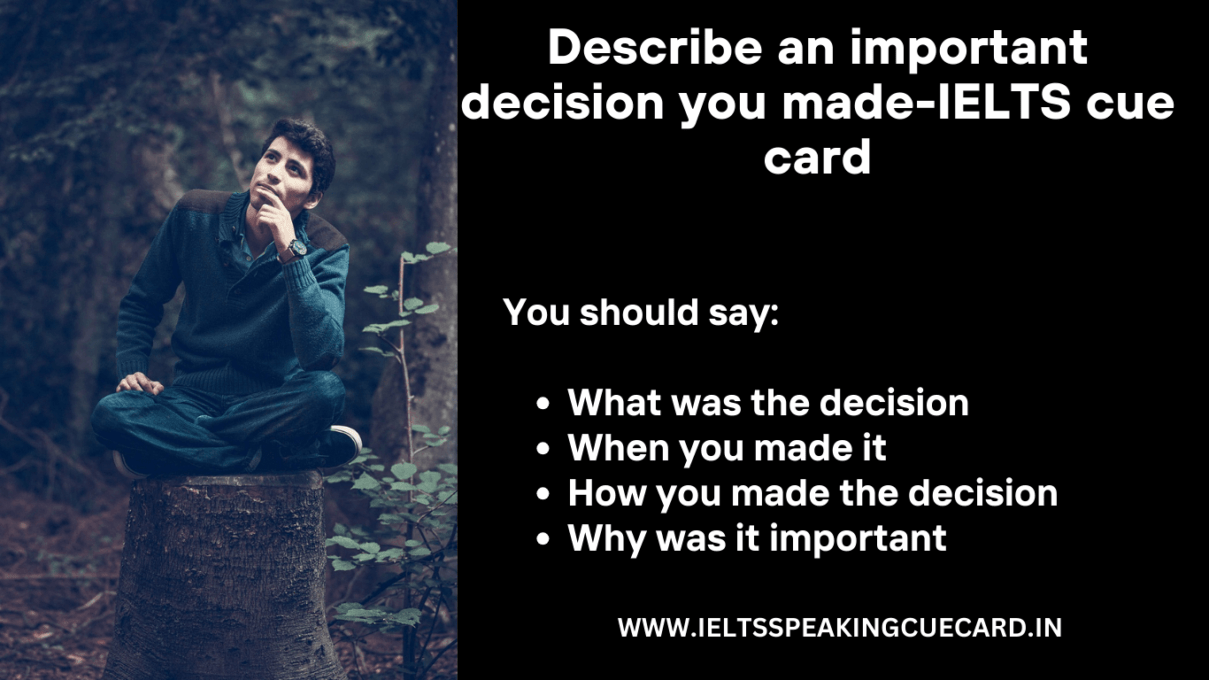Describe an important decision you made
You should say:
- What was the decision
- When you made it
- How you made the decision
- Why was it important
Sample Answer-2

Describe an important decision you made IELTS CUE CARD
Introduction:
Choosing my major in computer science stands out as a pivotal decision that significantly influenced my academic and professional journey. This decision was a defining moment during my high school to college transition, marking a crucial step toward aligning my passion with a rewarding career path.
What was the decision:
Opting for computer science as my major was a decision rooted in my fascination for technology and problem-solving. It involved selecting a field that resonated with my interests and held immense potential for personal and professional growth.
When you made it:
The decision to pursue computer science was finalized during my last year of high school, a period marked by a mix of excitement and apprehension as I envisioned the transition from school to college. The urgency to choose a major intensified as I considered the multitude of opportunities in the tech industry.
How you made the decision:
Making the decision involved introspection, research into the various disciplines within computer science, and discussions with mentors in the field. I considered my affinity for programming, the evolving landscape of technology, and the real-world applications of computer science, ensuring a well-informed choice.
Why was it important:
Opting for computer science was vital as it set the foundation for my academic and professional pursuits. In a world increasingly shaped by technology, this decision not only aligned with my passion but also offered a pathway to contribute meaningfully to the ever-expanding digital landscape.
Sample Answer-2

Describe an important decision you made IELTS CUE CARD
Introduction:
One of the most crucial decisions that profoundly impacted my life was selecting my college major after completing high school. This juncture demanded thoughtful consideration, and the repercussions of this choice reverberated through my academic and professional journey.
What was the decision:
The decision centered around choosing a college major that would shape my academic path and, subsequently, my career. It involved contemplating various fields, considering my interests, and envisioning the potential trajectories each major could offer.
When you made it:
This pivotal decision was made during the final year of high school, a time when students stand at the crossroads of their academic journey. The urgency to decide intensified as I approached the culmination of my high school education.
How you made the decision:
Making this decision involved a blend of introspection, researching potential majors, seeking guidance from mentors, and evaluating the alignment of each major with my skills and aspirations. It was a comprehensive process that aimed to align my academic journey with my long-term goals.
Why was it important:
The decision to choose a college major held paramount importance as it defined the direction of my education and, subsequently, my career. It was not merely about academic specialization but a critical step toward realizing my aspirations and contributing meaningfully to society.
Follow-up Questions:
1.Do you always ask for help when making decisions?
While I value seeking advice, I also believe in personal responsibility for decisions. I prefer a balanced approach, consulting mentors or experienced individuals when needed, but ultimately taking ownership of the choices I make.
2.Do you think teenagers are able to take decisions on their own?
Teenagers, with guidance and support, can make decisions on their own. It’s essential to empower them with information, encourage critical thinking, and foster decision-making skills gradually, allowing them to navigate choices independently.
3.Why can some make quick decisions and some cannot?
The ability to make quick decisions may stem from experience, confidence, or a decisive personality. On the other hand, those who struggle might weigh multiple factors, fear consequences, or simply prefer a more deliberative approach.
4.What should national leaders consider when they make decisions?
National leaders should consider the diverse needs and aspirations of their constituents, economic implications, diplomatic consequences, and long-term societal impacts. Inclusivity, informed decision-making, and a vision for national progress are crucial aspects.
5.Do you think children sometimes have to make important decisions?
While children may not face decisions of the same magnitude as adults, they often encounter choices related to education, hobbies, and friendships. These decisions contribute to their personal development and autonomy.
6.What important decisions do teenagers need to make after graduation?
Post-graduation, teenagers face decisions regarding higher education, career paths, and life goals. These decisions shape their professional journey and lay the groundwork for their adult lives.
7.Who can children turn to for help when making a decision?
Children can turn to parents, teachers, or trusted adults for guidance. Having a support system helps them navigate decisions with insights from experienced individuals who genuinely care about their well-being.
8.Do you think advertisements can influence our decisions when shopping?
Advertisements can indeed influence consumer decisions, often appealing to emotions, needs, and aspirations. However, making informed choices and avoiding impulsive decisions is essential.
9.Do you think the influence of advertising is good?
The influence of advertising can be both positive and negative. While it introduces products and services, fostering economic growth, it also poses the risk of creating unrealistic expectations and promoting materialistic values. Responsible advertising is crucial for a balanced impact.

